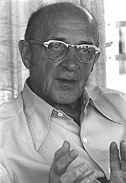
Carl Rogers (January 8, 1902 – February 4, 1987) was an influential American psychologist and among the founders of the humanistic approach to psychology.
Born in Oak Park, Rogers is widely considered to be one of the founding fathers of psychotherapy research and was honored for his pioneering research with the Award for Distinguished Scientific Contributions by the American Psychological Association in 1956.
The person-centered approach, his own unique approach to understanding personality and human relationships, found wide application in various domains such as psychotherapy and counseling (client-centered therapy), education (student-centered learning), organizations, and other group settings.
For his professional work he was bestowed the Award for Distinguished Professional Contributions to Psychology by the APA in 1972. Towards the end of his life Carl Rogers was nominated for the Nobel Peace Prize for his work with national intergroup conflict in South Africa and Northern Ireland.
In an empirical study by Haggbloom et al. (2002) using six criteria such as citations and recognition, Rogers was found to be the sixth most eminent psychologist of the 20th century and second, among clinicians, only to Sigmund Freud.
Between 1975 and 1980, Rogers, together with his daughter Natalie, conducted a series of residential programs in the US, Europe, and Japan. These Person-Centered Approach Workshops focused on cross-cultural communications, personal growth, self-empowerment, and social change.
Rogers' last years were devoted to applying his theories in areas of national social conflict, and he traveled worldwide to accomplish this. In Belfast, Northern Ireland, he brought together influential Protestants and Catholics; in South Africa, blacks and whites, in the United States, consumers and providers in the health field. His last trip, at age 85, was to the Soviet Union, where he lectured and facilitated intensive experiential workshops fostering communication and creativity.